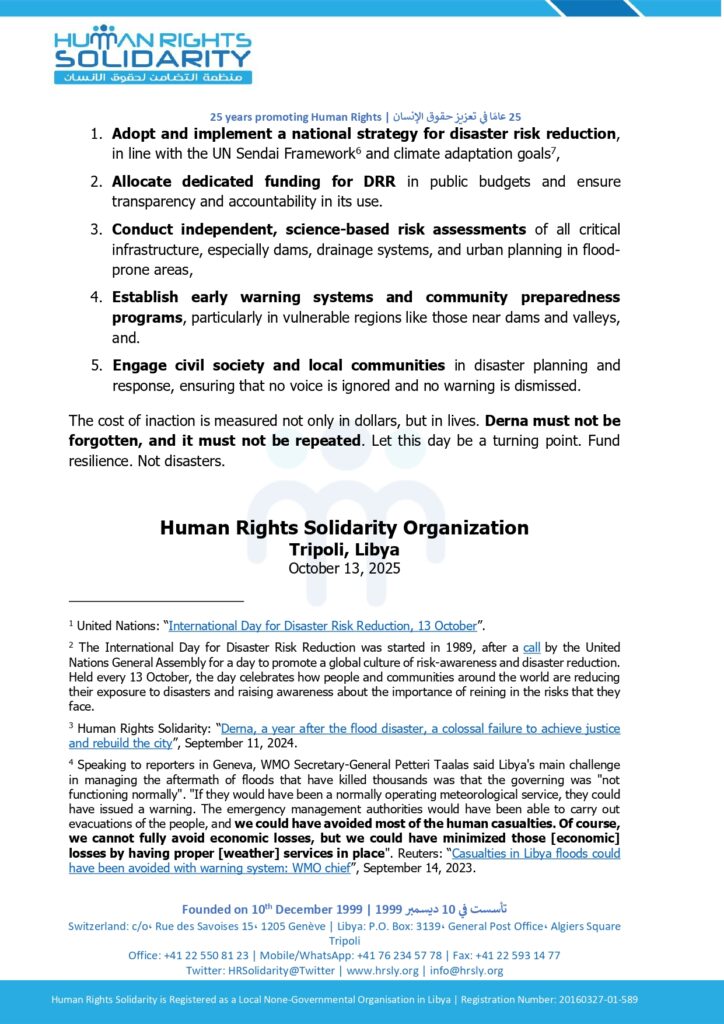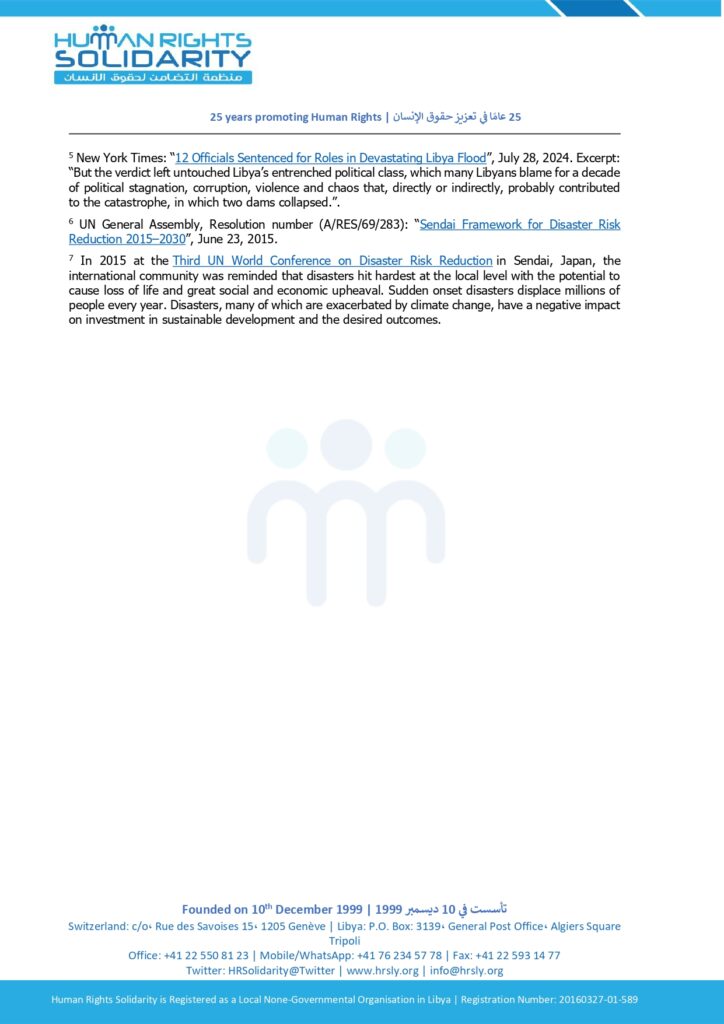International Day for Disaster Risk Reduction
Ref: PRS 2025/10/1070 13.10.2025
International Day for Disaster Risk Reduction1
2025 Theme: “Fund Resilience, Not Disasters”
HRS: “Two Years After Derna, Still No Lessons Learned”
On this International Day for Disaster Risk Reduction2, Human Rights Solidarity Organisation (HRS) joins the global call to “Fund Resilience, Not Disasters.” This year’s theme, set by the United Nations, is not a slogan—it is a warning. A warning that echoes painfully in Libya, where the memory of the Derna floods remains a wound unhealed, and its lessons unheeded.
Two years ago, in the early hours of September 11th, 2023, the city of Derna was devastated by a catastrophic flood triggered by Storm Daniel. Thousands perished, many more were displaced, and entire neighbourhoods were swept into the sea3. This was not a natural disaster alone—it was a man-made tragedy4, born of decades of neglect, corruption, and political paralysis. Despite repeated warnings about the structural dangers of the Wadi Derna dams, no preventive actions were taken. Despite early alerts about the approaching storm, no evacuation was ordered. Instead, a curfew was imposed—sealing the fate of thousands.
Today, we remember the victims not only with grief, but with righteous indignation. The investigations that followed failed to hold the true architects of this disaster accountable. The entrenched political class that ignored risk, silenced experts, and failed to act remains untouched5. And most alarmingly, no steps have been taken to prevent such a catastrophe from happening again.
The UN reminds us that disasters are becoming more frequent and more costly—driven by climate change and risk-blind development. Yet less than 1% of public budgets globally are allocated to disaster risk reduction (DRR), and only 2% of international aid projects include DRR goals. Libya is no exception. In fact, it is a stark example of what happens when resilience is not funded, and disaster is allowed to strike unchecked.
HRS calls on the Libyan authorities, both national and local, to:
Founded on 10th December 1999 | 1999 ب. ديسم 10 ف · تأسست
Switzerland: c/o، Rue des Savoises 15، 1205 Genève | Libya: P.O. Box: 3139، General Post Office، Algiers Square Tripoli
Office: +41 22 550 81 23 | Mobile/WhatsApp: +41 76 234 57 78 | Fax: +41 22 593 14 77 Twitter: HRSolidarity@Twitter | www.hrsly.org | [email protected]
1. Adopt and implement a national strategy for disaster risk reduction, in line with the UN Sendai Framework6 and climate adaptation goals7,
2. Allocate dedicated funding for DRR in public budgets and ensure transparency and accountability in its use.
3. Conduct independent, science-based risk assessments of all critical infrastructure, especially dams, drainage systems, and urban planning in flood- prone areas,
4. Establish early warning systems and community preparedness programs, particularly in vulnerable regions like those near dams and valleys, and.
5. Engage civil society and local communities in disaster planning and response, ensuring that no voice is ignored and no warning is dismissed.
The cost of inaction is measured not only in dollars, but in lives. Derna must not be forgotten, and it must not be repeated. Let this day be a turning point. Fund resilience. Not disasters.
Human Rights Solidarity Organization
Tripoli, Libya
October 13, 2025
1 United Nations: “International Day for Disaster Risk Reduction, 13 October”.
2 The International Day for Disaster Risk Reduction was started in 1989, after a call by the United Nations General Assembly for a day to promote a global culture of risk-awareness and disaster reduction. Held every 13 October, the day celebrates how people and communities around the world are reducing their exposure to disasters and raising awareness about the importance of reining in the risks that they face.
3 Human Rights Solidarity: “Derna, a year after the flood disaster, a colossal failure to achieve justice and rebuild the city”, September 11, 2024.
4 Speaking to reporters in Geneva, WMO Secretary-General Petteri Taalas said Libya’s main challenge in managing the aftermath of floods that have killed thousands was that the governing was “not functioning normally”. “If they would have been a normally operating meteorological service, they could have issued a warning. The emergency management authorities would have been able to carry out evacuations of the people, and we could have avoided most of the human casualties. Of course, we cannot fully avoid economic losses, but we could have minimized those [economic] losses by having proper [weather] services in place”. Reuters: “Casualties in Libya floods could have been avoided with warning system: WMO chief”, September 14, 2023.
Founded on 10th December 1999 | 1999 ب. ديسم 10 ف · تأسست
Switzerland: c/o، Rue des Savoises 15، 1205 Genève | Libya: P.O. Box: 3139، General Post Office، Algiers Square Tripoli
Office: +41 22 550 81 23 | Mobile/WhatsApp: +41 76 234 57 78 | Fax: +41 22 593 14 77 Twitter: HRSolidarity@Twitter | www.hrsly.org | [email protected]
5 New York Times: “12 Officials Sentenced for Roles in Devastating Libya Flood”, July 28, 2024. Excerpt: “But the verdict left untouched Libya’s entrenched political class, which many Libyans blame for a decade of political stagnation, corruption, violence and chaos that, directly or indirectly, probably contributed to the catastrophe, in which two dams collapsed.”.
6 UN General Assembly, Resolution number (A/RES/69/283): “Sendai Framework for Disaster Risk Reduction 2015–2030”, June 23, 2015.
7 In 2015 at the Third UN World Conference on Disaster Risk Reduction in Sendai, Japan, the international community was reminded that disasters hit hardest at the local level with the potential to cause loss of life and great social and economic upheaval. Sudden onset disasters displace millions of people every year. Disasters, many of which are exacerbated by climate change, have a negative impact on investment in sustainable development and the desired outcomes.
Founded on 10th December 1999 | 1999 ب. ديسم 10 ف · تأسست
Switzerland: c/o، Rue des Savoises 15، 1205 Genève | Libya: P.O. Box: 3139، General Post Office، Algiers Square Tripoli
Office: +41 22 550 81 23 | Mobile/WhatsApp: +41 76 234 57 78 | Fax: +41 22 593 14 77 Twitter: HRSolidarity@Twitter | www.hrsly.org | [email protected]




